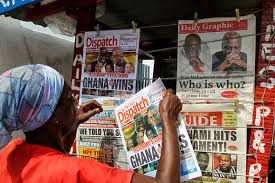The pledge of $250 million to support Ghana’s financial sector stability through a five-year project by the World Bank is one of the trending stories in the Ghanaian press on Monday.
The Graphic reports that the World Bank has pledged $250 million to support Ghana’s financial sector stability through a five-year project.
In a statement, the World Bank said the loan, approved on May 30, 2024, will be provided by the International Development Association (IDA), a World Bank arm dedicated to assisting low-income countries.
This project aligns with Ghana’s Financial Sector Strengthening Strategy (FSSS) and aims to address the impact of the country’s Domestic Debt Exchange Programme (DDEP) on banks and financial institutions.
The project will support the FSSS by contributing to financial stability through the recapitalization of viable Banks and Specialized Deposit-taking Institutions (SDIs) impacted by the DDEP.
The financial system is the lifeblood of Ghana’s economy,” said Robert R. Taliercio, World Bank Country Director for Ghana, Liberia, and Sierra Leone. “This project will strengthen financial stability by providing solvency support to banks and institutions affected by the DDEP, ensuring continued access to essential financial services for Ghanaians.”
The funds will be channelled through the Ghana Financial Sector Stability Fund (GFSF), established by the government to support struggling institutions. This project prioritizes immediate assistance to eligible undercapitalized banks and financial institutions, with provisions for future support if needed.
“The World Bank’s support aims to mitigate short-term shocks and promote long-term resilience in Ghana’s financial sector,” explained Carlos Leonardo Vicente, Senior Financial Specialist and Team Lead for the project. “Financial stability is crucial for protecting Ghanaians and preserving jobs.”
This initiative complements other World Bank programs in Ghana, including the Development Policy Financing series and the IMF’s Extended Credit Facility. These programmes focus on broader economic reforms and enabling financial institutions to operate profitably. The World Bank also supports projects focused on economic recovery and job creation, such as the Ghana Development Financing Project.
The newspaper says that the Norwegian Ambassador to Ghana, Ingrid Mollestad, has expressed the hope that Ghana will confirm its position as a beacon of democracy and peace in the sub-region as the 2024 elections draw closer.
She said she firmly believed that strong and independent institutions that served as the bedrock for democracy and paved the way for peaceful conduct in the international arena would play their roles.
To that effect, she reaffirmed her country’s commitment to support Ghanaian institutions to promote peace and stability.
Addressing Norway’s National Day at the Norwegian Embassy in Accra last Friday, Ms Mollestad said: “One such shared value is our commitment to democracy and human rights.”
“Liberia and Senegal, countries to which I am also accredited, have over the past year successfully held free and fair elections and peaceful transitions of power. Now it is an election year here in Ghana, and I am sure that the elections yet again will confirm Ghana’s position as a beacon of democracy and peace in the region,” she added.
The event attracted people from all walks of life, including the Attorney-General and the Minister of Justice, Godfred Yeboah Dame; the United Nations Resident Coordinator, Charles Abani, and the members of the diplomatic corps.
Ms Mollestad said over the past 20 years, Norway had supported Ghana to maintain peace and security. For instance, she cited how Norway had been supporting the Kofi Annan International Peacekeeping Training Centre, which she described as an invaluable resource for the UN and AU’s peacekeeping operations in the region and across Africa.
“Indeed, we are very pleased with our increased engagement in security and defence, reflecting our shared concerns for stability in the West African region,” she said.
The Ghanaian Times reports that the Public Utilities Regulatory Commission (PURC) has announced an increment in water and electricity tariffs, following the second quarter upward review, under the Quarterly Tariff Review Mechanism.
While electricity saw a 3.45 per cent increase in tariff for lifeline consumers (0-30kWh), water recorded an increase of 5.16 per cent for all customer classes for the period under review.
A press statement issued and signed by the Executive Secretary of PURC, Dr Ishmael Ackah, copied the Ghanaian Times, in Accra, yesterday, said the new tariffs increase for electricity and water would take effect on July 1, 2024.
The statement said household and industrial consumers would pay more utility tariffs for electricity and water.
The PURC said an increase of 5.84 per cent were to be incurred by all other residential electricity consumers, who were not part of the lifeline category bracket (31 kWh and above) as well as the non-residential category.
The statement said the PURC recommended a 4.92 per cent increase for those in the industrial category for electricity consumers, effective July 1, 2024.
The newspaper says that Ghana in 2023 recorded a trade surplus of GH¢5.3 billion driven largely by gold exports, the Ghana Statistical Service (GSS) Trade Report, has revealed.
This means that the country exported more products than it imported in the period under review.
The country in 2023 export¬ed products to the value of GH¢186.0 billion, compared with the GH¢180.7 million worth of products it imported.
Similarly, the value of the country’s exports increased to GH¢186.0 billion in 2023 from GH¢143.8 billion in 2022 and this represents an increase of GH¢42.2 billion and a 30-per¬centage points increase over the 2023 value of exports relative to the total export value of 2022.
Speaking at the launch of the GSS Trade Report in Accra yes¬terday, the Government Statisti¬cian, Professor Samuel K. Annim, said the total value of trade for 2023 stood at GH¢366.6 billion representing 43.6 per cent Gross Domestic Product.
As part of the programme, GSS also launched the first quar¬ter 2024 quarterly trade newsletter and Export and Import Price In¬dices, which measure the relative price of exported and imported products over time, and are used to deflate trade figures from nom¬inal to real values.
GIK/APA


